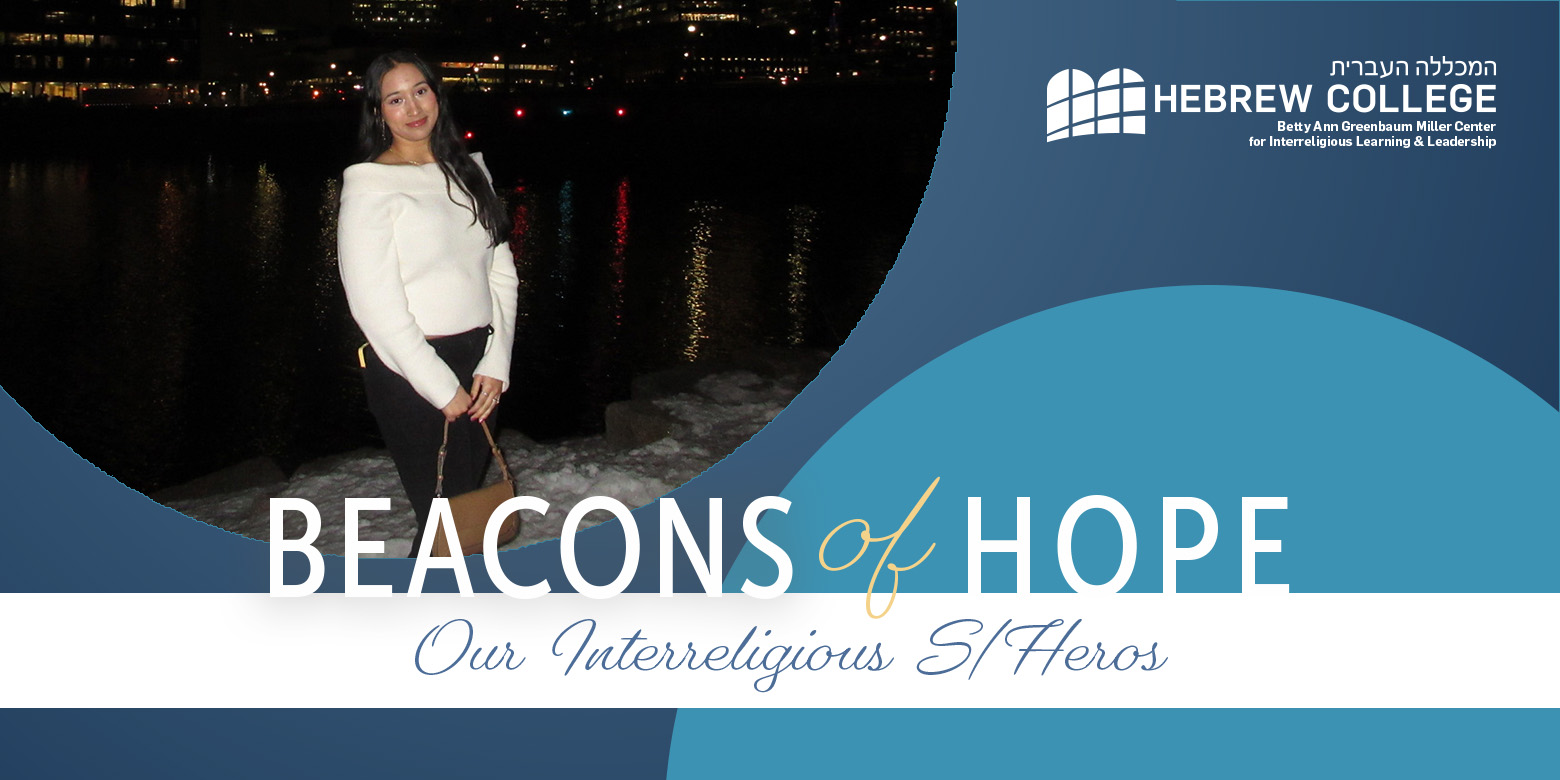Beacons of Hope: Our Interreligious S/Heroes Beacons of Hope: Prabh Dalla, Dignity Project Alum and Temporary Miller Center Administrator

Each month, we honor an individual or group whose commitments align with the bridge-building efforts of the Miller Center of Hebrew College. This September, we share our gratitude temporary Miller Center administrator and Dignity Project alumna Prabhdeep Dalla (who goes by Prabh). Prabh participated in the Dignity Project Fellowship as a rising high school senior and returned to the Miller Center four yeras later for the summer before her final year of college—this time as an invaluable contributor to the center’s operations with a new, behind-the-scenes perspective on interreligious work. We sat down to discuss life as a college student, religious identity, and the impact of her experiences with the Miller Center.
Q: To start, can you tell us a little about yourself and what you’re doing outside of the Miller Center?
Prabh: My full name is Prabhdeep, which in Sikhism means “God’s true light.” I’ve always felt that names can play an important role in shaping who we are.
I’m a nursing student at Salem State University, going into my senior year. I chose nursing because I’m empathetic and caring, and those qualities fit the profession well. I want to be there for people during their most vulnerable moments. Even now, working as a personal care assistant at Hebrew SeniorLife in Dedham, I feel like this field is rewarding.
Q: What do you enjoy outside of academics?
Prabh: I love watching movies and listening to music—especially R&B, rap, and Punjabi music, which connects me to my roots. I also enjoy going on walks, working out at the gym, hiking, exploring new restaurants and museums in Boston, and sometimes even kayaking when I’m feeling adventurous. Lately, I’ve been getting back into reading. Right now, I’m working through a psychology book that draws on Buddhist thought about shifting your mindset and navigating negativity.
Q: What was your experience like as a Dignity Project fellow?
Prabh: I was a fellow in 2021–2022, when the program was hybrid because of COVID. Shelton, who was the director at the time, was incredible—and the mentors really made the experience special as well.
At first, I was nervous to meet the other students, but over those six months I grew a lot. I expected the program to focus mostly on interfaith learning, but it went much deeper than that. It shaped me into a better person and taught me humility, communication, and how to think outside the box. I haven’t seen another program like it. Being with peers from so many different backgrounds—some applying to colleges like me, others still early in high school—was truly unique. Although we all come from different backgrounds, we all had more in common than we think.
Q: Do you have a favorite memory from your fellowship?
Prabh: A favorite memory of mine was the community service where we collectively made care packages for an organization. These packages included food and some supplies. I also cherished the opening and closing remarks that my peers presented to the group.
I also remember reading the bios of my fellow students before the program started and being struck by how diverse the group was. Looking back, I wish I had gotten to know everyone individually, but I still built meaningful connections with both peers and mentors.
Q: What inspired you to apply in the first place?
Prabh: I’ve always been curious about different cultures and religions. I knew a little bit about many traditions, but I am always open to learn more. At my Gurdwara in Westborough (Sikh place of worship), I had seen other kids a few years older than me participate, and eventually one of the facilitators at the religious school encouraged me to apply.
It was an honor to represent Sikhism, especially since not many people in the U.S. know about it. Sikhism is the fifth or sixth largest religion in the world, but here in America, people often just associate India with Hinduism. Sharing my culture and religion and raising awareness means a lot to me.
Q: Can you share a bit about your Sikh faith and how it shapes your life?
Prabh: Sikhism is a monotheistic religion that emphasizes humility, equality, honesty, and seva—selfless service. For me, I practice my religion internally. It’s about carrying those values in my heart and applying them in daily life.
The word Sikh itself means “learner.” I try to embody that by approaching life as a chance to keep learning and growing. Even small acts—like picking up something someone drops—can brighten someone’s day. You never know what another person is going through, so I try to lead with compassion.
Q: What has your experience at the Miller Center this summer taught you?
Prabh: It’s been very eye-opening. I started in July, after Liz [Aeschlimann, current Dignity Project Director] reached out, and I quickly realized how much behind-the-scenes work goes into making Miller Center programs possible—agendas, retreats, supplies, everything.
I’ve learned a lot about nonprofit and educational work. Before this, most of my jobs were in grocery stores or nursing homes, so this role was completely different—but I loved it. I got to meet new people, see how much planning and vision go into interfaith leadership, and feel like I was part of something meaningful.
Q: Finally, what advice would you give to someone considering the Dignity Project Fellowship?
Prabh: Go in with an open mind. Expect the unexpected. And be ready to feel uncomfortable—in the best way. The program will challenge your thinking and push you beyond your comfort zone. You might not notice the impact right away, but later you’ll see how much it shaped you through the conversations, reflections, and connections with peers and mentors. It definitely left a mark on me, and I think it will for anyone who joins.
Explore Graduate Programs Support Our Work Tamid Adult Learning Classes

